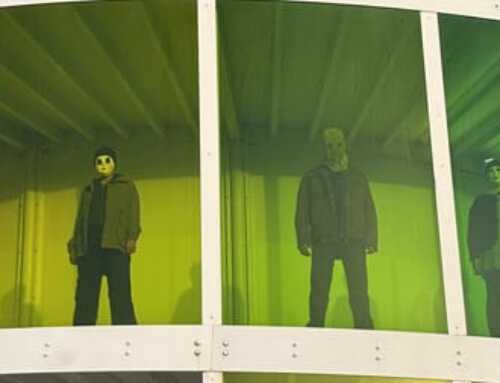The story of Alli, a mother of young children, who has grown frustrated with her husband and her daily routine. But her life is shaken up when two free-spirited twenty-somethings move in across the street and she discovers that she can see into their apartment.
The Neighbors’ Window (Marshall Curry Productions) opens with a shot of a typical childhood mess strewn beneath the main characters’ coffee table. Alli (Maria Dizzia) is cleaning up the hodgepodge of blocks and assorted crumbs as her husband Jacob (Greg Keller) walks back into the living room to announce that the children have successfully been put to bed for the night. As they regroup at the kitchen table the two discover that they can see straight through the window into the apartment in the next building, where a much younger couple have just moved in and are christening their new home.
Over the twenty-minute runtime we see the couple (especially Alli) becoming more fixated on the lives of the young people in the next building. While Alli toils away at maintaining domestic stability she’s drawn to watch the lively twenty-somethings’ day to day occurrences like dinner parties, lovemaking, and even at one point a supportive and heartfelt hug. Naturally, it is her tendency to compare the doldrums of her own life to the vivacious lives of the people across the way. That is, until a heartfelt conversation with the wife across the street (Juliana Canfield), which reminds her to embrace the things she has in her own life and to not be so quick to compare her situation to those around her.
What I found most successful about The Neighbors’ Window was the amount of character development which Marshall Curry managed to fit in a twenty minute short. Even ignoring the revelation at the end of the film, Curry manages to show the audience that despite being three kids and several years into their relationship, Jacob and Alli are still growing as a couple. Early on we witness Alli vent her frustrations to Jacob regarding his less than responsible behavior, and while I definitely got the impression that Jacob was a midlife crisis slacker who wasn’t pulling his own weight, he does manage to coax out the admission that some of Alli’s gripes (especially those about his voyeurism into the next door window) are being at least partially projected by Alli. Then, in the final scene of the short, Alli is left in the apartment alone for the day in presumably the same way that Jacob was left alone in the aforementioned scene. We learn that Jacob took the kids out for the day so that Alli can have a day to herself, and while it may not seem like much, it definitely felt like the Jacob that came home from the museum was a more mature one than the Jacob who was arguing about music contracts and using outdated slang fifteen minutes prior.
At its heart, this is a story about appreciating what you have. In the title I referred to the short as a parable, because at a very basic level the lesson here is not to covet the lifestyles of those around you and to be cognizant of the fact that even on most of our worst days there’s someone who would rather be in our position than their own. We often fall into our daily patterns and take our small comforts for granted, and it can be helpful to take a step back and acknowledge those things. The Neighbors’ Window does a great job of illustrating that. To borrow one of the thousands of social media self-help cliches: the grass isn’t greener on the other side, but where you water it.
| The Neighbors’ Window | ||
| RATING: | UR | No trailer available |
| Runtime: | 20 Min. | |
| Directed By: |
Marshall Curry
|
|
| Written By: |
Marshall Curry
|
|








